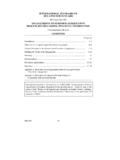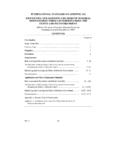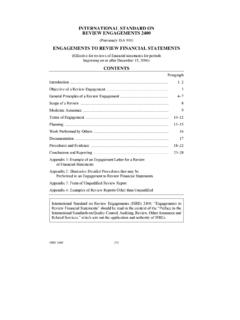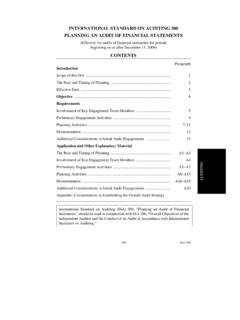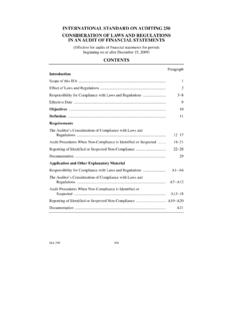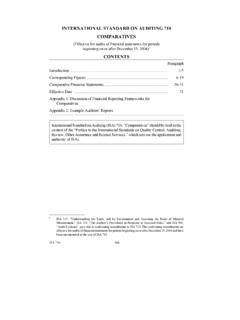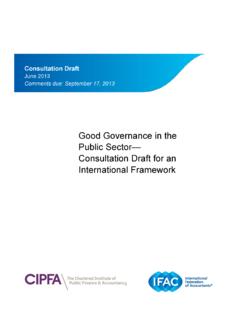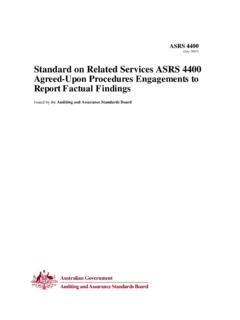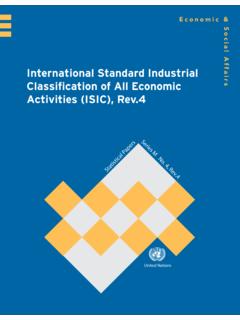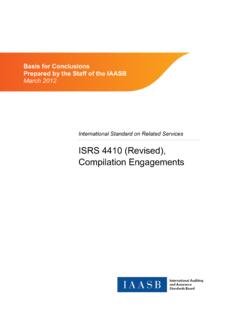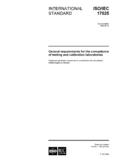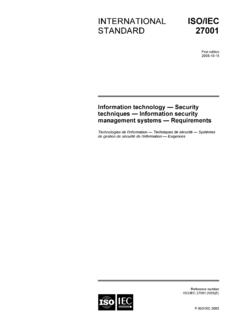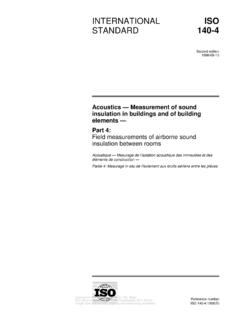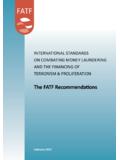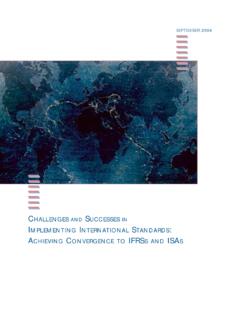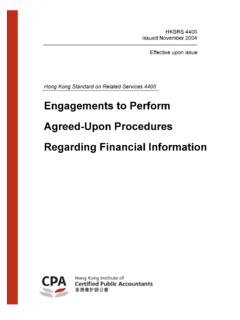Transcription of INTERNATIONAL STANDARD ON RELATED …
1 ISRS 4410 380 INTERNATIONAL STANDARD ON RELATED services 4410 (Previously ISA 930) ENGAGEMENTS TO COMPILE FINANCIAL STATEMENTS (This STANDARD is effective) CONTENTS Paragraph Introduction .. 1 2 Objective of a Compilation Engagement .. 3 4 General Principles of a Compilation Engagement .. 5 6 Defining the Terms of the Engagement .. 7 8 Planning .. 9 Documentation .. 10 Procedures .. 11 17 Reporting on a Compilation Engagement .. 18 19 Appendix 1: Illustration of an Engagement Letter for a Compilation Engagement Appendix 2: Illustrations of Compilation Reports INTERNATIONAL STANDARD on RELATED services (ISRS) 4410, Engagements to Compile Financial Statements should be read in the context of the Preface to the INTERNATIONAL standards on Quality Control, Auditing, Review, Other Assurance and RELATED services , which sets out the application and authority of ISRSs.
2 ENGAGEMENTS TO COMPILE FINANCIAL STATEMENTS ISRS 4410 381 RELATED services Introduction 1. The purpose of this INTERNATIONAL STANDARD on RELATED services (ISRS) is to establish standards and provide guidance on the accountant s1 professional responsibilities when an engagement to compile financial information is undertaken and the form and content of the report the accountant issues in connection with such a compilation. 2. This ISRS is directed toward the compilation of financial information. However, it is to be applied to the extent practicable to engagements to compile non-financial information, provided the accountant has adequate knowledge of the subject matter in question. Engagements to provide limited assistance to a client in the preparation of financial statements (for example, on the selection of an appropriate accounting policy), do not constitute an engagement to compile financial information.
3 Objective of a Compilation Engagement 3. The objective of a compilation engagement is for the accountant to use accounting expertise, as opposed to auditing expertise, to collect, classify and summarize financial information. This ordinarily entails reducing detailed data to a manageable and understandable form without a requirement to test the assertions underlying that information. The procedures employed are not designed and do not enable the accountant to express any assurance on the financial information. However, users of the compiled financial information derive some benefit as a result of the accountant s involvement because the service has been performed with professional competence and due care. 4. A compilation engagement would ordinarily include the preparation of financial statements (which may or may not be a complete set of financial statements) but may also include the collection, classification and summarization of other financial information.
4 General Principles of a Compilation Engagement 5. The accountant should comply with the Code of Ethics for Professional Accountants issued by the INTERNATIONAL Ethics standards Board for Accountants (the IESBA Code). Ethical principles governing the accountant s professional responsibilities for this type of engagement are: (a) Integrity; (b) Objectivity; (c) Professional competence and due care; 1 For the purposes of this ISRS and to distinguish between an audit and a compilation engagement the term accountant (rather than auditor ) has been used throughout to refer to a professional accountant in public practice. ENGAGEMENTS TO COMPILE FINANCIAL STATEMENTS ISRS 4410 382(d) Confidentiality; (e) Professional behavior; and (f) Technical standards .
5 Independence is not a requirement for a compilation engagement. However, where the accountant is not independent, a statement to that effect would be made in the accountant s report. 6. In all circumstances when an accountant s name is associated with financial information compiled by the accountant, the accountant should issue a report. Defining the Terms of the Engagement 7. The accountant should ensure that there is a clear understanding between the client and the accountant regarding the terms of the engagement. Matters to be considered include the following: Nature of the engagement including the fact that neither an audit nor a review will be carried out and that accordingly no assurance will be expressed. Fact that the engagement cannot be relied upon to disclose errors, illegal acts or other irregularities, for example, fraud or defalcations that may exist.
6 Nature of the information to be supplied by the client. Fact that management is responsible for the accuracy and completeness of the information supplied to the accountant for the completeness and accuracy of the compiled financial information. Basis of accounting on which the financial information is to be compiled and the fact that it, and any known departures therefrom, will be disclosed. Intended use and distribution of the information, once compiled. Form of report to be rendered regarding the financial information compiled, when the accountant s name is to be associated therewith. 8. An engagement letter will be of assistance in planning the compilation work. It is in the interests of both the accountant and the entity that the accountant sends an engagement letter documenting the key terms of the appointment.
7 An engagement letter confirms the accountant s acceptance of the appointment and helps avoid misunderstanding regarding such matters as the objectives and scope of the engagement, the extent of the accountant s responsibilities and the form of reports to be issued. An example of an engagement letter for a compilation engagement appears in Appendix 1 to this ISRS. ENGAGEMENTS TO COMPILE FINANCIAL STATEMENTS ISRS 4410 383 RELATED services Planning 9. The accountant should plan the work so that an effective engagement will be performed. Documentation 10. The accountant should document matters which are important in providing evidence that the engagement was carried out in accordance with this ISRS and the terms of the engagement.
8 Procedures 11. The accountant should obtain a general knowledge of the business and operations of the entity and should be familiar with the accounting principles and practices of the industry in which the entity operates and with the form and content of the financial information that is appropriate in the circumstances. 12. To compile financial information, the accountant requires a general understanding of the nature of the entity s business transactions, the form of its accounting records and the accounting basis on which the financial information is to be presented. The accountant ordinarily obtains knowledge of these matters through experience with the entity or inquiry of the entity s personnel. 13.
9 Other than as noted in this ISRS, the accountant is not ordinarily required to: (a) Make any inquiries of management to assess the reliability and completeness of the information provided; (b) Assess internal controls; (c) Verify any matters; or (d) Verify any explanations. 14. If the accountant becomes aware that information supplied by management is incorrect, incomplete, or otherwise unsatisfactory, the accountant should consider performing the above procedures and request management to provide additional information. If management refuses to provide additional information, the accountant should withdraw from the engagement, informing the entity of the reasons for the withdrawal. 15. The accountant should read the compiled information and consider whether it appears to be appropriate in form and free from obvious material misstatements.
10 In this sense, misstatements include the following: Mistakes in the application of the applicable financial reporting framework. ENGAGEMENTS TO COMPILE FINANCIAL STATEMENTS ISRS 4410 384 Non-disclosure of the financial reporting framework and any known departures therefrom. Non-disclosure of any other significant matters of which the accountant has become aware. The applicable financial reporting framework and any known departures therefrom should be disclosed within the financial information, though their effects need not be quantified. 16. If the accountant becomes aware of material misstatements, the accountant should try to agree appropriate amendments with the entity. If such amendments are not made and the financial information is considered to be misleading, the accountant should withdraw from the engagement.
